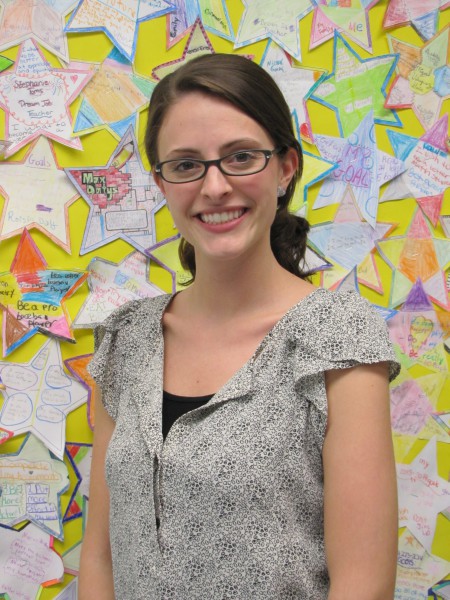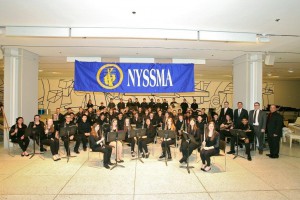Congratulations Dr. AJ Hepworth. Our very own HS Science Instructional Leader has just defended his doctoral dissertation. The study focused on whether or not eSpark increased student achievement. The results were a resounding yes. Here is the Abstract of the study:
The purpose of this study was to investigate how engagement, mood and number of assignments completed on computerized differentiated homework using an iPad in a one-to-one mobile device environment influenced the growth index and normalized gain in reading literature benchmark assessments of students in grades five, six, and seven. Furthermore, this study investigated if gender or special education status influences the growth index or normalized gain in reading literature benchmark assessment scores when using an iPad in a one-to-one mobile device environment on computerized differentiated homework.
Data from the Northwest Evaluation Association (NWEA) fall Measures of Academic (MAP) Progress assessment was analyzed for students’ areas of weakness in reading literature. Using assessment results, students were assigned differentiated homework to complete on an iPad, while reporting their level of engagement with the app and present mood. Growth and normalized gains were calculated following the spring administration of the NWEA MAP. Five hundred-twelve suburban public school students, grades five, six, and seven were given iPads containing differentiated homework assignments during the 2012-2013 academic year.
A one-way group analysis of variance (ANOVA) showed that there was a statistically significant difference for level of engagement with iPad applications among students in grades five, six, and seven. An independent t-test showed that special education students were significantly more engaged with their differentiated homework than students not classified as having special education status. An independent t-test showed that students with a positive mood had a statistically significant higher growth index and normalized gain than students with a negative mood.
The findings in this study revealed that when using an iPad to complete differentiated homework, student assessment scores in reading literature were influenced by grade level and mood. The findings in this study revealed student grade level and present mood influenced their growth on reading literature assessment scores when completing differentiated homework using an iPad. Additional findings indicated that as they got older, students reported less engagement with iPad assignments. The study concluded with recommendations for improving; engagement level, percentage of assignments completed and teacher awareness of student mood.
Posted 10 years ago at 8:04 am. Add a comment
Congratulations to Lindsay Spanhake who was recently named Middle School Math Teacher of the Year by the Nassau County Math Teacher’s Association. She was nominated for the award by instructional leader Andrew Casale for the way she encourages students every day, and her overall involvement in the school. In addition to serving as a math teacher, Ms. Spanhake is co-leader of the school’s Environmental Club, adviser of the Math Pioneers and chaperones all school dances and trips. In her classroom, she uses inquiry-based learning, promotes teamwork and tries to always connect math to their everyday lives. She is a fine example of how the teachers here in Mineola are always going above and beyond for our kids. 
Posted 10 years ago at 11:23 am. 1 comment
I joined Secretary of Education Arne Duncan and Commissioner King at his press conference yesterday to affirm Mineola’s work in implementing the Common Core Standards. This excerpt from the commissioner’s speech ran particularly true with me-
“Now – the work of raising standards for teaching and learning is work we launched
together. Not just the state – but the districts, the unions, the teachers, the legislature, the
governor – all with the support of the federal government. Everyone has had a voice in this.
It’s been open, transparent – and we have all known about it for years.
But for this to actually work and to make a difference in the lives of students, local
education leaders must implement these changes – thoughtfully, consistently and fairly.
Local leaders set budgets and priorities. They dedicate time and money to professional
development. They choose curriculum. They track results and they manage school schedules
to allow for planning and collaboration and create a culture of continuous improvement.
Several talented local superintendents are here with us today representing the 700 district
leaders across this state charged with delivering on the promise of the Common Core.”
While I don’t always agree with why and how things are done; I do agree that superintendents have a large responsibility to implement the new standards as smoothly and stress free as possible.
I like the Common Core Standards. I like the notion of teaching a concept before content. I think children learn so much more when they understand the underlining concept of material before they learn all of the facts. Our goal is for children to be invested in the material they learn- not regurgitate facts to do well on an exam and then forget everything they memorized a week later.
I like the curriculum that Mineola teachers have created. I like some of the materials in the NYS modules and more importantly I like the fact they we have local control over all curriculum decisions. No one is mandating we teach what the State has created. We are working and will continue to work on creating the best curriculum we can for students to achieve the standards. I commend our teachers on the work they are doing. Our teachers continue to implement and debrief on what materials are successful and which need to be changed.
In a time of change everything isn’t automatically perfect; change is messy. I think the State exams are a good example of that. I am not crazy about the State exams; but I understand they are a work in progress. They do not define good teaching and learning, nor do they define success or failure of a student or school. They are one measure of a child’s progress in meeting the standards. We have a lot of work to do in making formative assessments that inform a child’s progress in specific standards. Mineola is currently working on a digital solution that captures actual student work and tracks progress in the standards. We understand that if a child “doesn’t know what they don’t know” they are unlikely to improve in that area.
We all have a role in making the Standards successful. We can (and will) be stressed at times. But if we are patient, listen to one another and collaborate – I believe we can get it right. Only then will we be successful in preparing our children for the future.
Posted 10 years, 1 month ago at 3:58 pm. 1 comment
Last year 76% percent of the middle school participated in a volunteer program to get their ipads early. We were inundated the first few days and were happily surprised by the enthusiasm. What should we do this summer? Ideally if we allow the students to retain the ipads I would like to load the device with reading content and some work (eSpark or similar). More importantly I would like to pay our teachers to monitor the work a few hours a week via electronic dashboards. This way if a student is having an issue or not doing work at all – a teacher will be able to contact them via email. Over the years I have heard very opposite parental opinions of this topic. Many parents welcome the idea of summer work while others believe that summer is down time. I think my idea addresses the biggest complaint – no one checks the work that my child spent his/her time completing. I believe we can work around the logistical issues of issuing ipads (broken, lost, stolen, family moves). The question is- will we have parental support for student work over the summer? What do you say?
Posted 10 years, 1 month ago at 12:56 pm. Add a comment
Opt-out, APPR, common core standards, high stake testing-how did we get here? Indulge me as I over generalize – but I think the cycle goes like this; home values are based on successful schools. School success is defined by performance on standardized tests. Districts teach to the test to insure good results. When the test changes and no one knows the content being assessed scores drop and a panic ensues. Districts start to over react to the drop in scores and over emphasize test prep abandoning good teaching methodology and start chasing better results. Add to this mix that part of certain teachers evaluations are based on student performance and it is a recipe for disaster. Welcome to NYS public education 2014. School leaders need to recognize this paradigm and take steps to mitigate this. Some suggestions:
• Don’t fear the APPR
- The likelihood that a teacher will be dismissed using the current APPR construct is remote. To perpetuate that notion is foolish. Student achievement results are a small part of a system that educates the whole child.
• Control the curriculum
- Just because the NYSED created modules doesn’t mean Districts have to use them. Create time for teachers to collaborate and write curriculum. Some teachers prefer the modules because everything is laid out for them while others feel they stifle creativity. You must find the happy medium and create curriculum that capitalizes on teachers experience with the content.
• Support teachers
- Creating the curriculum is one thing; helping teachers navigate new content and methodologies is paramount. Invest in professional developers that are not administrators to help model lessons and unpack the standards
• Don’t test prep
- Why spend countless hours preparing students for an exam when the content is unknown? We need to focus our class time on engaging students in authentic learning activities that require students to think
• Learning is supposed to be fun
- Promote fun- instill a love of learning in children while challenging them in rigorous content. This is why a great teacher is worth his/her weight in gold
• Figure out how to measure growth in the standards
- The standards are designed to examine student work in very specific areas to determine student growth. Electronic portfolios that accurately capture work in the standards should be the goal of effective assessments.
I think we can all agree that the State assessments are “not ready for prime time” yet we continue to use them as the benchmark to determine successful schools. As long as society continues to promote this myopic view of successful schools we will continue to organize curriculum and practice to deliver results. I find it ironic that Newsday’s cover story is about the number of student opt-outs on the State exam and then they direct readers to last year’s test scores. Maybe the silver lining of the “opt-out” movement will be that it will lead to a better definition of a successful school. Ultimately don’t we want kids to be challenged in appropriate content at their level while simultaneously enjoying school? How do you measure that?
Opt-out, APPR, common core standards, high stake testing-how did we get here? Indulge me as I over generalize – but I think the cycle goes like this; home values are based on successful schools. School success is defined by performance on standardized tests. Districts teach to the test to insure good results. When the test changes and no one knows the content being assessed scores drop and a panic ensues. Districts start to over react to the drop in scores and over emphasize test prep abandoning good teaching methodology and start chasing better results. Add to this mix that part of certain teachers evaluations are based on student performance and it is a recipe for disaster. Welcome to NYS public education 2014. School leaders need to recognize this paradigm and take steps to mitigate this. Some suggestions:
· Don’t fear the APPR
- The likelihood that a teacher will be dismissed using the current APPR construct is remote. To perpetuate that notion is foolish. Student achievement results are a small part of a system that educates the whole child.
· Control the curriculum
- Just because the NYSED created modules doesn’t mean Districts have to use them. Create time for teachers to collaborate and write curriculum. Some teachers prefer the modules because everything is laid out for them while others feel they stifle creativity. You must find the happy medium and create curriculum that capitalizes on teachers experience with the content.
· Support teachers
- Creating the curriculum is one thing; helping teachers navigate new content and methodologies is paramount. Invest in professional developers that are not administrators to help model lessons and unpack the standards
· Don’t test prep
- Why spend countless hours preparing students for an exam when the content is unknown? We need to focus our class time on engaging students in authentic learning activities that require students to think
· Learning is supposed to be fun
- Promote fun- instill a love of learning in children while challenging them in rigorous content. This is why a great teacher is worth his/her weight in gold
· Figure out how to measure growth in the standards
- The standards are designed to examine student work in very specific areas to determine student growth. Electronic portfolios that accurately capture work in the standards should be the goal of effective assessments.
I think we can all agree that the State assessments are “not ready for prime time” yet we continue to use them as the benchmark to determine successful schools. As long as society continues to promote this myopic view of successful schools we will continue to organize curriculum and practice to deliver results. I find it ironic that Newsday’s cover story is about the number of student opt-outs on the State exam and then they direct readers to last year’s test scores. Maybe the silver lining of the “opt-out” movement will be that it will lead to a better definition of a successful school. Ultimately don’t we want kids to be challenged in appropriate content at their level while simultaneously enjoying school? How do you measure that?
Posted 10 years, 1 month ago at 3:32 pm. Add a comment
The following was written by Tom Dolan (Superintendent of Great Neck), Patrick Manley (Superintendent of Franklin Square) and me. It was rejected as an Op ed piece in the Times and Newsday…
APPR- A modest proposal by those tasked to implement it
Much of the current debate on high stakes testing and common core implementation can be traced back to the passage of the APPR law. It wasn’t until student achievement on State exams was tied to teacher evaluation that testing became an issue; after all we have had 3-8 grade testing in place since 2001. Oddly no discussion is currently underway to fix the genesis of the problem. The putative purpose of APPR was to improve teacher performance. However even a cursory review of its implementation will reveal that the system was not designed to achieve that purpose. Consider the following:
- The same system was imposed upon all teachers across the State without any differentiation. No consideration was given to how a teacher or District was performing or historical data. This is something you can liken to providing all patients in a hospital with the same medication with no effort to diagnose what ails them.
- The tests used to assess teacher performance are designed to measure student achievement. To employ another simple analogy, this would be similar to looking at a patient’s blood work to determine the efficacy of a Doctor’s efforts. There are too many variables to establish a direct correlation.
- Even in the face of universal agreement that the common core standards upon which the aforementioned tests are based have been poorly implemented, there were those who insist that teacher evaluation continue in unmodified fashion simply because it is “time to do so”.
- Finally, the forced implementation of lower scores on the tests that would be used to evaluate teacher performance makes obvious that there are at least extraneous, if not alternative, motives at work in the delivery of these teacher scores.
Each special interest group has attempted to explain possible reasons for this disconnect. They include private corporations that will see great financial opportunity in creating and scoring tests that stand behind these efforts. Those same organizations are likely to see earning opportunity in creating textbooks and review materials to help schools assist students to prepare for these tests.
Perhaps by painting a belief that there is a universal failure of public education special interest groups and a few elected officials will find it easier to privatize it; that debate is also taking place. The failure to address the obvious flaws in the APPR law lends credibility to this argument.
Professional teacher organizations need to work collaboratively with politicians to resolve this issue. No one who considers themselves a true educator is afraid of higher standards for accountability. However, no one who is been paying attention to the drama surrounding the teacher evaluation debate over the last few years believes that the system that has been designed will achieve that purpose.
An alternative to developing such a system would be to rely upon educators to assist in its development and take just a little bit more time to do so collaboratively. The convoluted system currently in place essentially tests children to assess adults. The traditional 3-8 State exams (as required by Federal law) represent scores for approximately 20% of the State’s teachers. In order to evaluate the remaining 80% of teachers many districts implemented additional exams. Districts had to submit and obtain approval on Student Learning Objectives (SLO’s) that demonstrated how each teacher would be assessed for 20% local and 20% State exams. (areas for which a State exam didn’t exist the District created one). The over testing of children was inevitable; more importantly it is unnecessary.
A more productive APPR process would gather multiple sources of data over a period of time that ultimately determines whether or not is qualified. Teacher qualification is determined through the certification process. The APPR should gather information over a five year period that assesses teaching practice, student achievement (where applicable) and teacher certification exams to ultimately determine whether or not a teacher retains his/her certification. The current requirement of 175 professional development hours is loosely constructed and offers little in the way of teacher assessment.
The law needs to be simplified. It should group teachers into two categories: 1) classroom teachers whose students take a State exam and 2) all other teachers. Sixty percent of both categories should be classroom observation and performance. The process to obtain this score should be the only locally negotiated decision. It would streamline the submittal and approval process tremendously and eliminate the Student learning Objectives (SLO’s). In category 1 the remaining 40% should be 20% student achievement and 20% content exam, developed by an outside vendor and given to the teacher. The results of five years should be averaged together to determine if the teacher earned recertification. If a teacher fails to achieve recertification at this point, they would be called upon to develop a one year plan to address their deficiencies, with support from the district and oversight by the State. In category 2 – no student achievement data need be considered. That 20% should be replaced with an additional exam for the teacher on current practice and methodology. These teacher exams are already being developed as part of the new EdTPA teacher certification process. In addition, College schools of education must be offered ownership in the process. They should be involved in preparing teachers to take these exams. Any part of this proposal can be tweaked and adjusted but the critical piece is simple- stop testing children to rate adults. Adults are perfectly capable of taking their own exams and demonstrating their own competencies. This scenario not only allows the Governor to continue his quest for teacher accountability it enhances it. It eases parental concerns about high stake testing and allows teachers a five year window to demonstrate that they are effective. Isn’t this a ‘win-win’ for everyone involved?
Posted 10 years, 1 month ago at 10:24 am. Add a comment
On Monday the high school concert band visited Albany as part of the Statewide NYSSMA music in our schools month. On hand to greet the students were Assemblyman Ed Ra and Senator Jack Martins. After they played the Senator took the students on a tour of the Senate chamber and floor. Special thanks to Joe Owens and Don Carreras for organizing the experience.


Posted 10 years, 1 month ago at 6:59 am. Add a comment
Matt DeLuca can rest now. After directing three consecutive student performances he is ready for the April break. Boy does he deserve it. His high School musical debut- The Wedding Singer was unbelievable. Matt Eisen’s swan song proved to be his best performance. He captivated as Robbie, the wedding singer, he even has his Adam Sandler voice down! Rebecca Bastos owned the stage (as usual) in her portrayal of Julia Sullivan. We had our usual scene stealers- Michelle Serna as Linda, Katie Barnwell as Grandma (happily my grandmother was nothing like that!) Quinn Ginsberg as the obnoxious Glen and Bonnie Small as Angie. Newcomer Aldrian Diaz was a RIOT!! I am still laughing as some of his lines. Equally impressive was another underclassman- Jake Siegfried (and his hair) shined as Sammy. The boys gave us a glimpse of the future. Lastly there always seems to be a surprise in each show; someone traditionally in the ensemble that takes center stage and blows us away. Kristyn Velez did that to me this year. Not only was she in excellent voice but her mannerisms and expressions as Holly were phenomenal. Special shout out to Lenny Mora, you don’t always have the ‘starring role’ but you are never missed in the ensemble. This show gave you some great lines! Congrats to Drew Smith, Don Carreras, Aislinn Oliveri , Meg Messina and Joe Owens on another fabulous production. Theater is alive and well in Mineola!!
Posted 10 years, 1 month ago at 7:31 am. Add a comment
Yesterday I had the privilege to attend the 10th annual Al county art exhibition at Adelphi University. The day is organized by the Art Supervisors Association, the event features over 1,000 artists from District across Nassau County. Mineola had 15 entries K-12. Special congratulations to Kristen Sze-Tu for being named our senior scholarship recipient. Other entries included:
Dallas Malone. Tieara Roland, Jamie Valentino, Mia Wasnofski, Maggie Duda, Isabella Guzzardo, Taylor Attard, Dania Martinez, Desiree Mohammadi, Christina Mirao, Jinal Patel, Max Datys, Maya Diaz-Portalatin, Ambar Rivera.
Congratulations to all of these wonderful artists.




Posted 10 years, 1 month ago at 7:24 am. Add a comment
For the second time, the high school hosted the Mustang Olympics to raise money for a great cause. Newsday sent a photographer and videographer. Here is a link to the video:
http://www.newsday.com/long-island/nassau/mustang-olympics-in-mineola-1.7236282
The photo MAY run in an edition of the paper this weekend. Keep an eye out.
Posted 10 years, 2 months ago at 10:56 am. Add a comment







